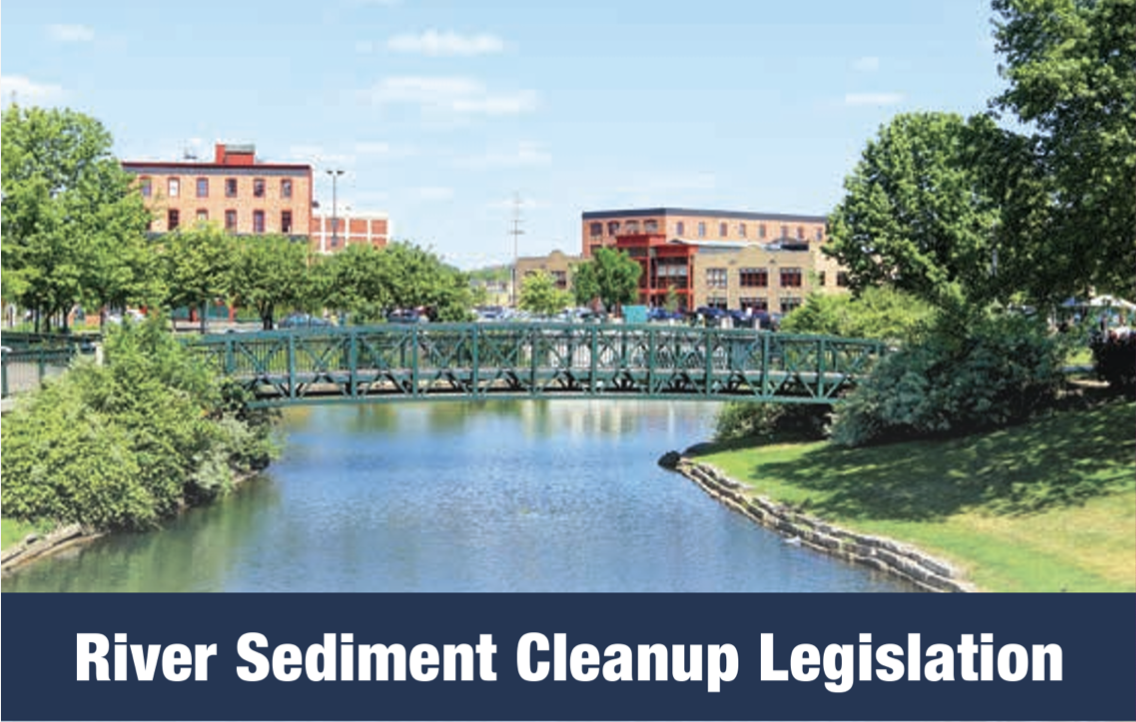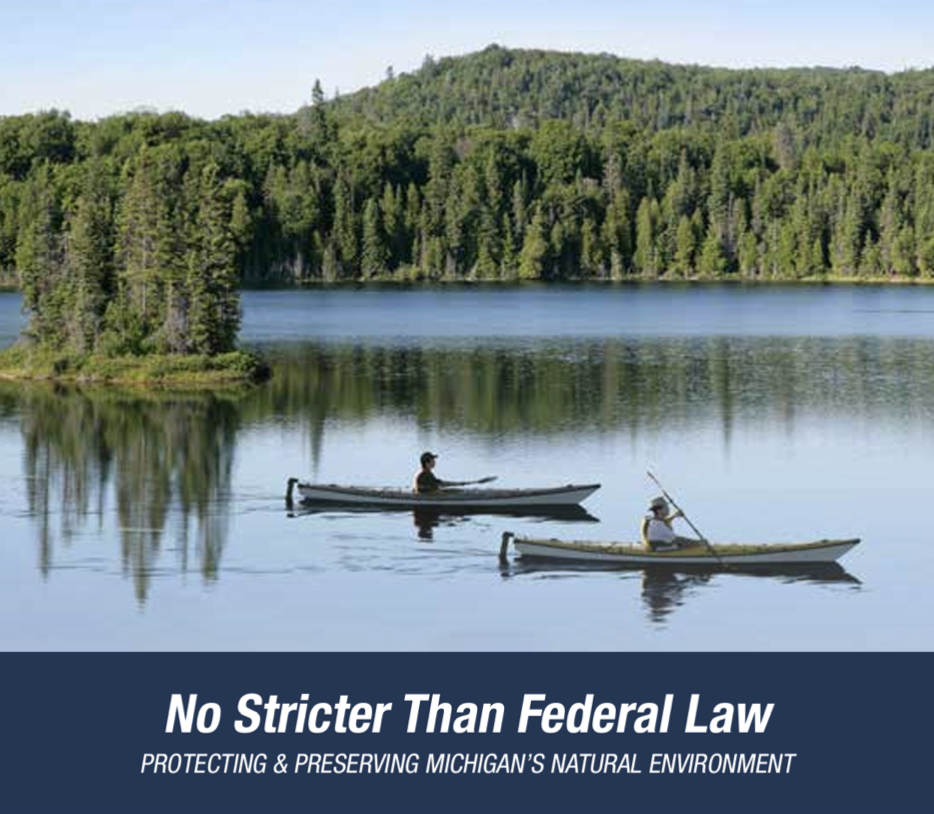
Dear Neighbor,
It is an honor to serve the people of Kalamazoo County and Antwerp Township in the State Capitol in Lansing every day, where making environmental protections for our community and Michigan is one of my top priorities. As the Chair of the Senate Energy and Environment Committee, it is critical to me that we protect and preserve our natural resources.
This newsletter shares updates on my legislative efforts to combat climate change, promote clean energy, safeguard our environment, protect our waterways, and preserve the integrity of our Great Lakes.
If I can be of assistance to you at any time, you can always reach me by email at SenSMcCann@senate.michigan.gov or by phone at (517) 373-5100.
Sincerely,

Sean McCannState Senator19th District
Clean Energy Future Plan
For years, Michigan citizens have called for decisive action to address concerns about climate change — concerns that have long gone unaddressed. Last year, my legislative colleagues and I took decisive steps to address these concerns, and I was proud to help lead the charge as Chair of the Senate Energy and Environment Committee.
The enactment of the Clean Energy Future Plan, comprised of Senate Bills 271, 273, 277, 502, and 519, marks a significant milestone in our efforts to achieve a better, brighter future in Michigan.
These new laws are integral to my vision of diversifying Michigan’s economy, supporting workers, farmers, consumers, and positioning our state as a national leader in clean energy. Moreover, it ensures freedom and personal property rights for landowners while maintaining safeguards for local communities.
Recognizing the increasing frequency of severe weather events and extreme temperatures due to climate change, the Clean Energy Future Plan represents a substantial effort by the Legislature and Gov. Gretchen Whitmer to create a healthier, more sustainable environment for Michigan.
Key points of these new laws include setting long-awaited clean energy and renewable energy standards, increasing energy efficiency targets, establishing a new Community and Worker Economic Transition Office, and expanding the role of the Michigan Public Service Commission (MPSC) in overseeing decisions about critical energy infrastructure.
For more than four decades, Michigan has grappled with having the most expensive, least reliable, and dirtiest electricity in the nation. These new laws are pivotal in propelling Michigan towards a cleaner future, addressing longstanding issues of reliability and affordability while laying the groundwork for a more sustainable energy landscape.
Public Act 235 of 2023 requires publicly regulated energy companies to:
- Generate 50% of their energy through renewable sources by 2030
- Generate 60% of their energy through renewable sources by 2035
- Meet 100% clean energy standards by 2040
- Construct or acquire a total of 2,500 megawatts of energy storage systems by 2030
The law also raises Michigan’s cap on distributed energy generation from 1% of a company’s average peak load to 10%.
Public Act 229 of 2023 increases Michigan’s energy waste reduction standard:
- From 1% to 1.5% for electrical sources
- From .75% to .875% (beginning in 2026) for natural gas
The bill also requires energy providers to create a low-income energy waste reduction program and direct 25% of waste reduction spending to the program.
Public Act 231 of 2023 sets new requirements for Michigan’s energy regulators, the MPSC:
- Directs the MPSC to prioritize reliability and equitable access to programs
- Directs the MPSC to evaluate the safety and resiliency of our utility systems, especially in overburdened communities
- Requires the Department of Great Lakes and Environment (EGLE) to assess the environmental justice and impacts of the clean energy plans
The law also increases funding for consumer representation in MPSC cases.
With these new laws enacted by Governor Whitmer, Michigan has positioned itself for a greener future and to become a leader in clean energy.

River Sediment Cleanup Legislation
The Kalamazoo River, spanning 130 miles across our state’s western landscape, is more than just a waterway, it is a hub of activity, offering endless opportunities for outdoor fun, whether it’s hiking, biking, or simply soaking in the natural beauty right in the heart of urban areas like downtown Kalamazoo. For many in our community, it’s a treasured escape, a place where we can unwind and connect with nature.
Unfortunately, in 2019, the operator of the Morrow Dam in Comstock Township, undertook repairs without consulting with the Michigan Department of Environment, Great Lakes and Energy (EGLE) and Department of Natural Resources (DNR), resulting in the release of over 400,000 cubic yards of harmful sediment downstream into the Kalamazoo River. This man-made ecological disaster has inflicted enduring harm upon the river’s ecosystem, endangering its plant and animal life and its recreational enjoyment. The dam operator is currently being sued by Michigan Attorney General Dana Nessel.
Ensuring the health and preservation of our waterways and lakes in Michigan is a top priority for me as your State Senator. That’s why, in the aftermath of this latest disaster inflicted on the Kalamazoo River, I introduced Senate Bill 398. This important legislation is designed to empower EGLE with the authority needed to compel entities who violate the Natural Resources and Environmental Protection Act to address their actions and take necessary steps to minimize harm to the environment and the residents of the affected areas.
Senate Bill 398 has already passed through the Senate and is now under review in the House of Representatives. As I work to get this legislation over the finish line, I will continue to fight for the protection of our environment and waterways in District 19 and throughout all of Michigan.

No Stricter Than Federal Law
In order for Michigan to be a national and global leader in protecting and preserving our environment, Michigan needs the ability to go beyond the lowest federal standards to protect our natural resources and public health.
Federally-set environmental standards should be viewed as the floor, not the ceiling. Every state has unique needs, and our Great Lakes State is certainly no exception. That is why I introduced Senate Bill 14 that was signed into law by Gov. Gretchen Whitmer last July, repealing Public Act 602 of 2018. Public Act 602 of 2018 prohibited Michigan from setting standards that exceed federal rules.
Under my new law, Michigan regained the ability to set our own protection requirements and guidelines that could go beyond federal standards if needed — ensuring our state can act swiftly with the best science available in the future.
Whether it’s protecting Lake Erie from harmful algae blooms, addressing the Flint Water Crisis, or ensuring our drinking water is safe from PFAS contamination, Michigan has a history of exceeding federal standards to protect our precious Great Lakes and waterways. While I’m pleased to see this legislation was signed into law, I will continue to advocate for protecting and preserving Michigan’s natural environment.

Expanding Michigan’s Bottle Deposit Law
Over 40 years ago, Michigan became a pioneer with its historic ‘Bottle Bill’ to promote recycling and prevent littering. To this day, it is our state’s most widely used and accepted state conservation program. We have an opportunity and responsibility to expand upon the success of the iconic legislation from the 1970s — that is why I introduced Senate Bill 453.
This legislation would expand the 10-cent deposit to most non-carbonated beverage containers. There is no reason that some of our plastic, glass and aluminum water bottles, and other single–use containers are not returnable when we have a functioning system that consumers and retailers are familiar with.
In addition to expanding Michigan’s Bottle Deposit Law, this legislation would direct a portion of the increased funds to help communities throughout the state prioritize recycling initiatives and combat pollution through Michigan’s Cleanup and Redevelopment Trust Fund.
We must act now to protect our future by expanding our beverage container recycling system to keep bottles and cans out of landfills.
The bill has been referred to the Senate Regulatory Affairs Committee and is awaiting further consideration.

